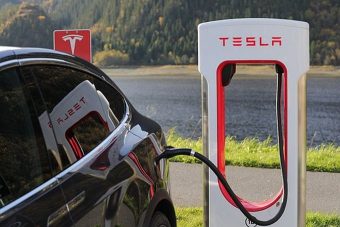
A partnership of electric vehicle (EV) manufacturers, NGOs, and energy trade bodies have called on EU member states to rapidly accelerate the roll out of electric car and rail infrastructure in order to better support Europe’s low emission transport sectors.
The Platform on Electro-Mobility coalition, which includes leading EV manufacturers such as Tesla and Renault-Nissan and engineering giants such as Siemens, today said EU policymakers needed to accelerate efforts to electrify urban and inter-city transport networks.
For instance, it said a joined-up and accessible network of electric vehicle charging stations – including normal, fast and smart charging options – was crucial for supporting the growing EV sector, with more publicly accessible charging stations needed along major roads as well as in urban areas for both buses and cars.
Moreover, it called for greater flexibility in response to EV connector requirements, in order to encourage tech innovation and ensure drivers have full confidence in the long term viability of their vehicles.
The move follows a $1bn joint agreement announced in November between some of the biggest names in the global car industry, including BMW, Ford and Volkswagen, to build a new ultra-fast EV charging network across Europe in a bid to encourage the mass-market take up of low emission cars.
The calls come ahead of a major upcoming survey of 43,000 people across 52 countries which found that around 40 per cent of drivers would consider buying an electric vehicle for their next car.
However, the Platform on Electro-Mobility today warned that despite member states being required to submit plans for supporting charging infrastructure by the end of last year under the Alternative Fuels Infrastructure Directive 2014, around half of EU members have still not done so.
Further support is also needed from member states to help boost provision for EV charge points from buildings, the coalition said, by adding EV charging provisions into the EU’s Energy Performance of Buildings Directive.
Nicolas Erb, chair of the Platform, said the EU should set aside more resources to support EV infrastructure, and also called for public and private transport options, from metros to e-bikes, to all be fully integrated into the EU’s future low carbon, smart grid-enabled energy system.
“Europe has a huge opportunity to win on so many fronts with e-mobility,” said Erb. “For a start, we’ll recover the €1bn or so a day Europe currently spends on high-polluting oil; we’ll hugely increase access to mobility; we’ll create high-quality jobs and we’ll save countless lives by cutting air pollution.”
Erb added: “E-mobility may be a quiet revolution but it’s a crucial one. Besides metros and tramways, there are now over two million electric vehicles on the world’s roads – so we are at a tipping point – but we need to change-up a gear to really make it happen.”
The diverse Platform includes more than 20 members, such as the London Taxi Company, the European Cyclists Federation, Solar Power Europe, the European Rail Industry, and Wind Europe.
Marie-France Van-der-Valk, head of Renault-Nissan’s Brussels office, said the electrification of transport was underway and the societal benefits were becoming clearer every day. “It is more important than ever that public authorities fully support the development of a regulatory framework and infrastructure network enabling us to tap its full potential,” she said.
Source: businessgreen.com



